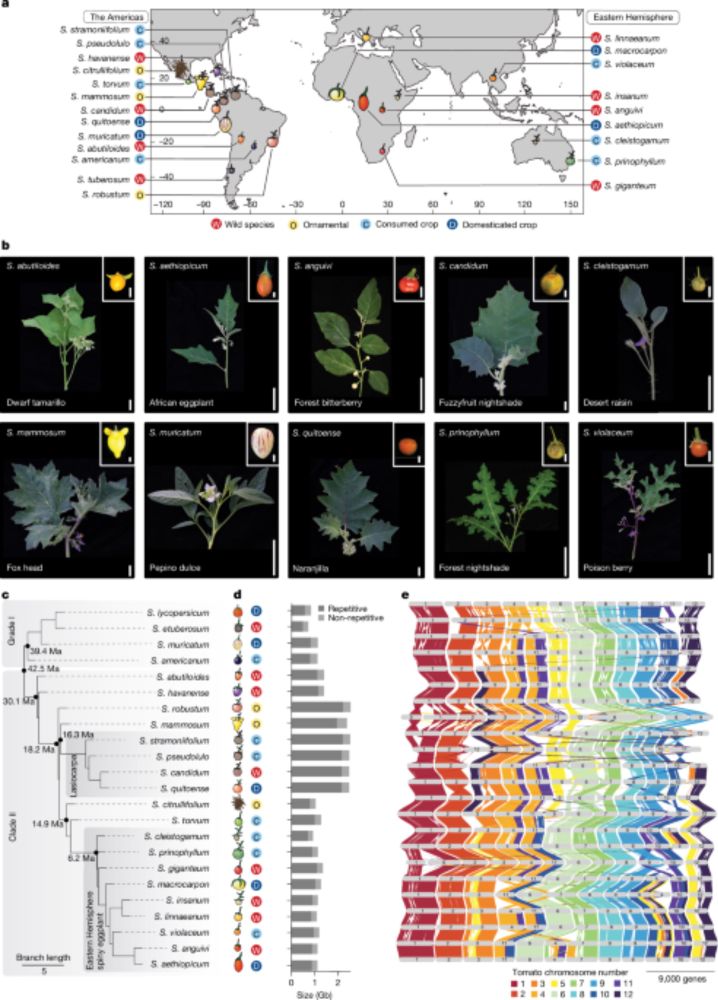Recherche @INRAE | Genome plasticity, chromatin biology & epigenetics in plant-microbe symbioses | He/Him


Open to early career researchers with 3 to 5 years experience post-PhD.
Applications close on 1 November. Don't miss out!
www.newphytologist.org/grants-award...
#ecrchat #phdchat

Open to early career researchers with 3 to 5 years experience post-PhD.
Applications close on 1 November. Don't miss out!
www.newphytologist.org/grants-award...
#ecrchat #phdchat
Here's the poster if you'd like to check out some of our recent work: doi.org/10.5281/zeno...
Here's the poster if you'd like to check out some of our recent work: doi.org/10.5281/zeno...

👉 @stefaniapaltri.bsky.social and @clarissezigue.bsky.social explain their story behind joining this program, the motivations, and more
🔗 youtu.be/LND9nEA18W8
Don’t miss the upcoming episodes of Voice Marie Curie 🎓

👉 @stefaniapaltri.bsky.social and @clarissezigue.bsky.social explain their story behind joining this program, the motivations, and more
🔗 youtu.be/LND9nEA18W8
Don’t miss the upcoming episodes of Voice Marie Curie 🎓
We’re thrilled to be hosting the @episeedlink.bsky.social International Conference, an exciting opportunity to share research and connect with the community.
Don’t miss your chance to take part, it’s going to be a great one!
👉 Save 9-10th Feb, 2026

We’re thrilled to be hosting the @episeedlink.bsky.social International Conference, an exciting opportunity to share research and connect with the community.
Don’t miss your chance to take part, it’s going to be a great one!
👉 Save 9-10th Feb, 2026


w/ @yvdp.bsky.social
#PlantSci #Evolution
academic.oup.com/plcell/advan...

w/ @yvdp.bsky.social
#PlantSci #Evolution
academic.oup.com/plcell/advan...
Ideal for candidates with backgrounds in genomics, evolution, or computational science moving to Plant Biology.
Reach out if interested and eligible!

Ideal for candidates with backgrounds in genomics, evolution, or computational science moving to Plant Biology.
Reach out if interested and eligible!
🌿🌿Our article on fern immunity has been peer-reviewed 🌿🌿
Thanks to @madeleinebaker.bsky.social @kellerjeanphd.bsky.social @maximebonhomme.bsky.social @pierremarcdelaux.bsky.social and @jacquet-chris.bsky.social
a quick thread 🧵 1/4

🌿🌿Our article on fern immunity has been peer-reviewed 🌿🌿
Thanks to @madeleinebaker.bsky.social @kellerjeanphd.bsky.social @maximebonhomme.bsky.social @pierremarcdelaux.bsky.social and @jacquet-chris.bsky.social
a quick thread 🧵 1/4


Congrats @melaniekrich.bsky.social @tatiana-vernie.bsky.social et al. for the hard work!
EPP1 is the fourth member of the Common Symbiosis Pathway 🍄🌱!
The continuation of a long standing project started by @oswaldovaldesl.bsky.social in @jeanmichelane.bsky.social‘s lab. 1/7 🧵

Congrats @melaniekrich.bsky.social @tatiana-vernie.bsky.social et al. for the hard work!
EPP1 is the fourth member of the Common Symbiosis Pathway 🍄🌱!
The continuation of a long standing project started by @oswaldovaldesl.bsky.social in @jeanmichelane.bsky.social‘s lab. 1/7 🧵

The continuation of a long standing project started by @oswaldovaldesl.bsky.social in @jeanmichelane.bsky.social‘s lab. 1/7 🧵
✨ Book your slot here 👉 www.fetedelascience.fr/la-symbiose-...
🎉 Join us for a fun time at Fête de la Science!


doi.org/10.1126/scie...

doi.org/10.1126/scie...

academicjobsonline.org/ajo/jobs/30607
academicjobsonline.org/ajo/jobs/30607

We’re appointing 3 Associate Professors in:
🌱 Plant Sciences
🦉 Animal Behaviour
🔬 Molecular Cell Biology
3 fields. 3 opportunities. One new home for Oxford Biology.
Learn more 👉 bit.ly/41S2Tc7
Apply now 👉 bit.ly/488CNW3

We’re appointing 3 Associate Professors in:
🌱 Plant Sciences
🦉 Animal Behaviour
🔬 Molecular Cell Biology
3 fields. 3 opportunities. One new home for Oxford Biology.
Learn more 👉 bit.ly/41S2Tc7
Apply now 👉 bit.ly/488CNW3

